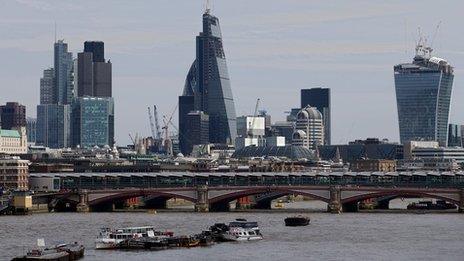The collapse of bankers' self esteem
- Published
- comments

There is something a bit odd perhaps about the banks setting up a new body to ensure that their people are following high professional standards and treating customers properly.
On the one hand, it won't be the arbiter of whether individuals have breached banking standards - because the City watchdog, the Financial Conduct Authority (FCA), will soon announce how it intends to exercise those powers (having been urged by the Parliamentary Commission on Banking Standards to draft a new "single" set of banking standards to be followed by all).
But it will develop codes of conduct that are somehow aligned with, but presumably not duplicative of, the FCA's new standards. It will assess the training programmes of banks and third party providers for their appropriateness and fitness. And once a year it will present its findings to the boards of each bank on whether ethical behaviour is - or is not - at the heart of the respective banks' culture and practices
It is all about providing greater confidence to us that we are being treated decently by the banks.
But in most industries, treating customers well is a competitive issue.
For example, you would not expect Tesco, Sainsbury and Asda to set up and fund an independent body to tell them how to provide confidence to their customers that they're not being ripped off.
So the appointment of Richard Lambert, the former FT editor and ex-director general of the CBI, to set up this new monitor of bankers' behaviour shows just how low bankers' self-esteem has sunk.
Apart from anything else, it is less than a couple of years since the UK's eight biggest banks set up the Professional Standards Board of the Chartered Banker Institute to "support the ethical awareness, customer focus and competence of those working in the banking industry" and "build, over time, greater public confidence and trust in individuals, institutions and the banking industry overall, and enhance pride in the banking profession".
Does the decision of the banks to finance the Lambert Plan show that the banks have written off that earlier initiative as a dead loss? That is unclear.
But they clearly don't believe it is sufficient to restore their public standing.
So what is the big conspicuous difference between that Professional Standards Board and the Lambert model?
Well the Professional Standards Board is governed, at the top level, exclusively by serving bankers. Whereas Lambert has insisted that no senior active bankers will be on his board - though three out of the 10 members would be recently retired bankers or independent non-executive directors of banks (the others would include a consumer voice, a trade unionist, an accountant, an investor, a small business person, an academic and even - oh dear - a hack).
Which probably tells you all you need to know.
However bankers do have to be wary of one thing.
Customer service and reputation for fair dealing is a competitive issue. And in an industry historically notorious for collusion, the bankers have to be careful that Lambert isn't seen as a veil for a collusive attempt to persuade all of us that the biggest banks are all much of muchness when it comes to conduct, thus deterring us from shopping around for the best and most sensitive customer service.